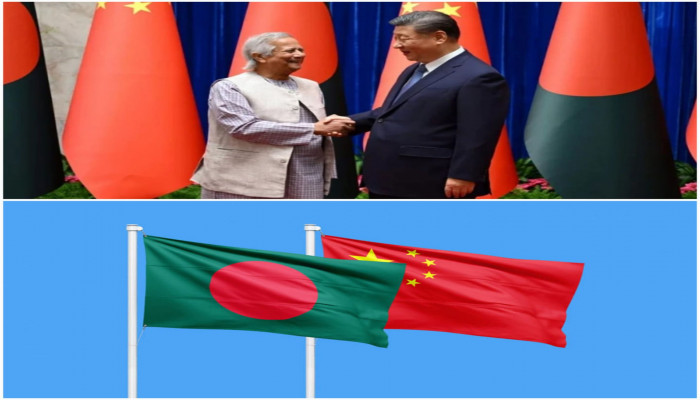Muhammad Yunus highlights Bangladesh as 'sole guardian of the ocean' for India's Landlocked Northeast
- In Reports
- 06:15 PM, Mar 31, 2025
- Myind Staff
During his four-day visit to China, Bangladesh’s interim government chief adviser, Muhammad Yunus, invited Beijing to expand its regional presence. While making this appeal, he pointed out that India’s seven northeastern states are landlocked. In a widely shared video on social media, Yunus urged the Chinese government to set up an economic base in Bangladesh, highlighting that Dhaka is the “sole guardian of the ocean” in the region.
"Seven states of India, the eastern part of India, called the seven sisters ... they are a landlocked country, a landlocked region of India. They have no way to reach out to the ocean," Yunus conveyed in the video. "We are the only guardians of the ocean for all this region. So this opens up a huge possibility. So, this could be an extension of the Chinese economy. Build things, produce things, market things, bring things to China, bring them out to the whole rest of the world," Yunus stated.
Sanjeev Sanyal, a key economic advisor to Prime Minister Narendra Modi, recently posted a video on the social media platform X, "Interesting that Yunus is making a public appeal to the Chinese on the basis that 7 states in India are land-locked. China is welcome to invest in Bangladesh, but what exactly is the significance of 7 Indian states being landlocked?"

During his four-day visit to China, Yunus met with Xi Jinping and requested a 50-year master plan from Beijing for river water management, including the Teesta River, which is shared with India upstream. He referred to China as the “master of water management.”
“We have come here to learn from you how we can make water resources useful to people,” he was quoted as saying by the state-run Bangladesh Sangbad Sangstha (BSS).
Yunus addressed concerns regarding the Teesta River System but emphasised that “Bangladesh's problem lies not just with one river, but with the (entire) system.”
The former Hasina-led government had pursued India's participation in the Teesta River basin project. At the same time, Bangladesh and China had productive discussions about finalising the Implementation Plan for their agreement on sharing hydrological data for the Yarlung Zangbo-Jamuna River, which originates in China and flows through India before reaching Bangladesh. Additionally, both countries agreed to strengthen maritime collaboration and plan to hold another round of talks on the subject at a mutually convenient time.
"Bangladesh welcomes Chinese companies to participate in the Mongla Port Facilities Modernisation and Expansion Project and is ready to collaborate with China to further develop the Chinese Economic and Industrial Zone (CEIZ) in Chattogram," as stated.
“The Bangladeshi side welcomes Chinese companies to participate in the Teesta River Comprehensive Management and Restoration Project (TRCMRP)”, the joint press release stated.
As reported by BSS, China has allocated around $400 million to modernise Bangladesh’s southwestern Mongla seaport, $350 million to develop the China Industrial Economic Zone, and an additional $150 million for technical assistance. "The remaining funds will be provided as grants and other forms of financial support," the BSS report stated.
Also, Bangladesh and China strengthened their ties on Friday by signing an economic and technical cooperation agreement and eight Memoranda of Understanding (MoUs) covering various areas like culture, media, sports, and health. Yunus also met with Chinese President Xi Jinping during the trip, and both sides released a joint statement.
“In addition to this, five announcements were made on the launching of formal negotiations on investment, the announcement of the commencement of the China Industrial Economic Zone, the signing of a commercial agreement for the modernisation and expansion of Mongla port, the building of a robot physiotherapy and rehabilitation centre, and the donation of a cardiac surgery vehicle”, it said.
In a joint press release, Bangladesh reaffirmed its strong commitment to the One-China principle, stating that the Government of the People’s Republic of China is the only legitimate authority representing all of China and that Taiwan is an inseparable part of its territory. Bangladesh also expressed its opposition to “Taiwan independence”. It voiced support for China concerning its core interests and its efforts to protect national sovereignty and territorial integrity.
Shariqul Alam, the Press Secretary to the Chief Advisor, described the meeting between the two leaders as “most important and successful.” He added that Yunus emphasised Bangladesh’s historical relationship with China.
“Professor Yunus’s meeting with Xi Jinping was the most important and successful. The meeting was very cordial. Professor Yunus highlighted Bangladesh’s historical connection with China and mentioned the 50th anniversary of the diplomatic relations between our two countries,” Alam stated.
“He (Yunus) discussed our issues with China, and the important thing is that the Chinese President responded positively about each issue and said China is fully supportive of Professor Yunus’s government”, the Press Secretary to the Chief Adviser made a statement.







Comments